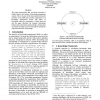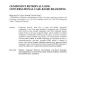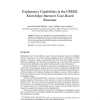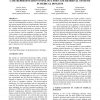FLAIRS
2001
14 years 4 months ago
2001
This paper demonstrates that case-based reasoning is ideally suited to the creation of knowledge management systems. This is because of the close match between the activities of t...
IFIP12
2004
14 years 4 months ago
2004
: Component retrieval, about how to locate and identify appropriate components, is one of the major problems in component reuse. It becomes more critical as more reusable component...
FLAIRS
2004
14 years 4 months ago
2004
Case-Based Reasoning (CBR) is a recognised and well established method for building medical systems. In this paper, we identify strengths and weaknesses of CBR in medicine. System...
COMMA
2006
14 years 4 months ago
2006
In this paper we present a novel approach for combining Case-Based Reasoning (CBR) and Argumentation. This approach involves 1) the use of CBR for evaluating the arguments submitt...
SCAI
2008
14 years 4 months ago
2008
Reusing past experiences by reasoning from past cases poses particular problems when the input to case retrieval comes from large amounts of online data. Volve has developed a syst...
SCAI
2008
14 years 4 months ago
2008
The ability to give explanations for its reasoning and behaviour is a core capability of an intelligent system. There are a number of different goals a user can have towards such e...
LWA
2007
14 years 4 months ago
2007
We propose SEASALT, an architecture based on the CoMES approach on developing collaborative multi-expert-systems using case-based reasoning and software agents technology. SEASALT...
AIA
2007
14 years 4 months ago
2007
In multidisciplinary medical services (e.g. Intensive Care Units or Pain Management Centers), Case-Based Reasoning systems require good case representations. When multiple disorde...
EWCBR
2008
Springer
14 years 4 months ago
2008
Springer
In this paper we propose an approach to address the old problem of identifying the feature conditions under which a gaming strategy can be effective. For doing this, we will build ...
DCAI
2008
14 years 5 months ago
2008
Case-Based Reasoning is a methodology that uses information that has been considered as valid in previous situations to solve new problems. That use of the information allows CBR s...





